- Home
- Travel to Cyprus
Travel to Cyprus

The Republic of Cyprus is one of the most beautiful tourist destinations; just ask one of the 2.5 million tourist from all over the world who visit Cyprus each year. Whether they come in organized tour groups or on private get-aways, they are all drawn for the same reasons:
Weather in Cyprus:
The weather is spectacular, even by Mediterranean standards. With over 300 sunny days per year, Cyprus is an island paradise, even in the winter.
Security in Cyprus:
A 2015 Valuepenguin analysis rated Cyprus as one of the safest countries, not just in the EU, but in the whole world, comparable to Switzerland, Spain, Singapore, and Japan.
Currency in Cyprus:
The Republic of Cyprus is an EU country and uses the euro (EUR) €.
Prices in Cyprus:
Cyprus has always been affordable, but after the 2013 financial crisis, the economy slowed and there were further price decreases as well as deflation of the Euro.
Traveling now is cheaper than ever!
Island's location and area:
Cyprus is located in the heart of the Mediterranean Sea, nestled between Europe, Asia, and Africa. The island’s small size (just 9,251 sq. kilometers, with a max. length of 222 kilometers and max. width of 95 kilometers), makes it easy to travel!
A drive from one corner to the other takes less than three hours!
Beaches in Cyprus:
For 10 years, Cyprus has been ranked first place for the cleanliness and beauty of their beaches. With three world records to their name and 57 Blue Flag Awards, these beaches are both divine and renowned for their safety and positive environmental impact.
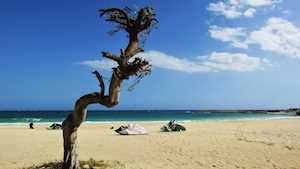 |
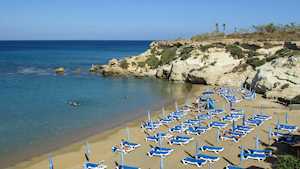 |
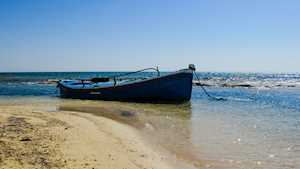 |
Mountains in Cyprus:
Though it may be more famous for its beaches, Cyprus has two breath-taking mountain ranges- the Kyrenia mountain and the Troodos Mountains. Mount Olympus stands as 1,952 m, making it high enough to become a popular destination to ski!
Tourist attractions in Cyprus:
With hundreds of tourist attractions on one accessible island, Cyprus has something to offer everyone.
Nature-lovers can rejoice at the landscapes brimming with soaring mountains, crystal-clear waters, sparkling beaches, and sprawling Mediterranean vineyards.
Adventure travelers have their pick of skiing in the snow-capped Trodoos mountains, snorkeling the translucent sea, and hiking through ancient Roman ruins.
History buffs will have a field-day exploring the one of the oldest civilizations in the world and visiting numerous UNESCO world heritage sites, monasteries, ancient temples, mosques, and churches.
Those seeking a peaceful, halcyon vacation can stroll the beaches of quiet seaside villages, peruse the shops of authentic local artisans, spend the afternoons touring wineries, and the evenings enjoying the dazzling catch-of-the-day as the sun sets over the Mediterranean sea.
With so many options, at first it may feel hard to pinpoint the greatest draw of all, but it doesn’t take anyone long to notice the support and warmth of the local residents.
The kindness and Courtesy of the Cypriot people:
Cypriots are known for their warmth and friendliness. Asking a local for help with directions, or where to find a great pub, may well lead to making a new friend.
Opulent Culture :
Cyprus boasts one of the oldest civilizations in the world, with a rich culture that spans 11,500 years. Cyprus’s unique geographic position has made it ripe for conquering, and there are archeological remnants from the stone-age Cypriots, Mycenaean Greeks, Phoenicians, Egyptians, Assyrians, Romans, Franks, Venetians, Ottomans, and British. Cyprus has received UNESCO World Heritage Status for three sites, and has ten more currently being reviewed.
In 1571, Cyprus was conquered by the Ottoman empire, who ruled there until 1878, when the British gained control. Cyprus did not gain its independence until 1960, when it signed a deal that ended the British occupation but allowed Britain to maintain two military bases. In 1974, Turkey invaded again and took the Northern half of the island. Their peaceful occupation remains until today. As a result, Cypriot culture is greatly influenced by Britain and Turkey.
Food in Cyprus:
The perfect meeting of Greek, Mediterranean, Turkish, and North African culinary traditions happen everyday on Cyprian tables.
Cyprus boasts a wide variety of cuisine, from fresh seafood to mouthwatering street-food.
The most famous morsel is the local Halloumi cheese, served fresh-grilled on salads, paninis, or dipped into locally-made olive oil as an appetizer. It’s made from a mixture of goat and sheep’s milk.
Meat-lovers rave about the Souvlaki, a popular street food similar to a kebab, but with uniquely Cypriot seasonings.
As you sip your post-dinner Traditional Cypriot Coffee, you can indulge your sweet tooth with Spoon Sweets, a Cypriot delicacy of preserved fruits made from fresh fruits and nuts.
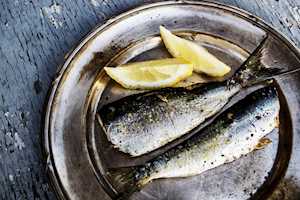 |
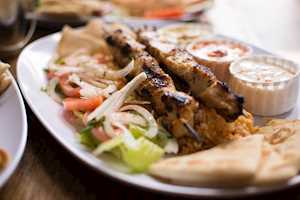 |
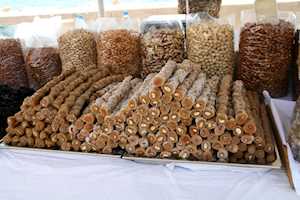 |
Languages in Cyprus:
The official languages are Greek in the South and Turkish in the North, although most of the island speaks Greek.
English is widely spoken, a remnant of both English rule and the island’s concerned efforts to remain tourist-friendly.
Transportation:
Like the U.K., traffic stays on the left. There are many highways connecting the main cities, and there are two international airports, one in Larnaca and one in Paphos. There are also two ports. The main port is in Limassol and there is a smaller port in Larnaca.
Important and useful information for travelers in Cyprus:
There are about 1.2 million residents that live on the Cypriot island.
The island is divided. While The Republic of Cyprus gained its independence from the Britain on August 16,th 1960, the Turks invaded in 1974 and conquered the Northern side of the island. Turkish occupation remains today, although this does not have a substantial impact for tourists.
The primary agricultural products are lemon, citrus, vegetables, fruits, barley, grapes, olives, chicken, pigs, lambs, beef and cheese.
The main industries are tourism, agriculture, concrete and drywalls, ship building, textile, chemical, paper, timber, masonry, and ceramics.
- Time zone in Cyprus: GMT +2
- Internet domain: .cy
- cyprus Calling code: +357
- Area codes: Nicosia: 02, Ayia Napa: 03, Larnaca: 04, Limassol: 05, Paphos: 06
- Emergency Telephone Number (English is spoken): 199
- Hospital Information Telephone Number: 1400
For more information about travelling in Cyprus, please contact: info@1000mfs.com